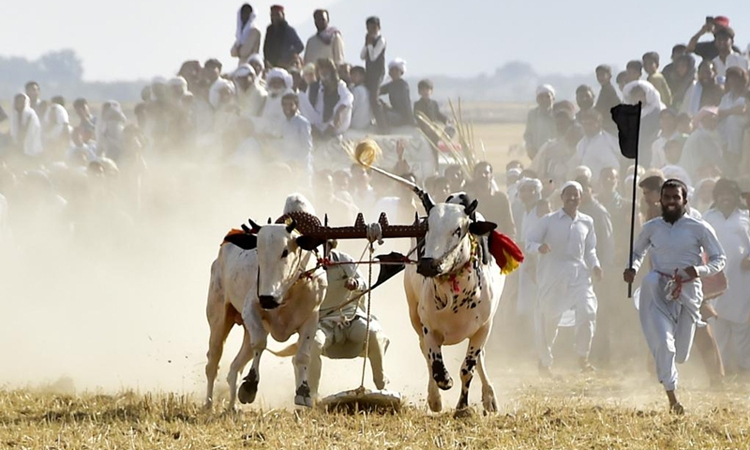Traditional Games — A dying legacy of our rich culture


Once an integral part of our culture, traditional games like ‘bulls race’, ‘native wrestling’, ‘kabaddi’, ‘hide and seek’, ‘dog and bear fight’, ‘equilibrists jugglery,’ and much more, gradually faded away and replaced by modern and online computer games.
The mesmerizing melodious voices of Roosters’ ‘Cock-a-doodle-do’ to partridges’ ‘Kut, Kut, kut’, Quails’ ‘Wet My Lips’, Cuckoos’ ‘Cuck-oo’, or sparrows’ chirping are also no more heard even at village fairs and festivals, if any organized somewhere in the country these days.
The legacy of skill, strength, agility, speed, strategy and endurance manifested in “kabaddi, desi kushti, malakhra, dog racing, and cocks fighting,” once mandatory part of our rural life, is gradually dying with the passage of time.
“Such melodies are hard to find these days though they were once remarkable features of rural life,” said Ahmad Ali Ghabro from Shujabad. “Onslaught of modern gadgets out rightly changed the situation. Now, our younger generation only reads in books about these sports.”
Gone are the days when people used to nurture cocks, quails, roosters, cuckoos for their melodious voice competitions and the winners were awarded prizes. And if any exists somewhere it keeps away from the eyes of media.
“Media is enormously overwhelmed by coverage of cricket, football, hockey and other games for being driven by potent advertising mechanisms and financing by the governments, sports bodies and commercial entities,” said Manzoor Pehelwan, a wrestling veteran retired from PIA.
“Before partition ‘Desi Kushti’ was as popular as cricket is today. There were 100 to 150 ‘Akhadas’ in Multan alone where wrestlers were trained,” said Manzoor, once an active organizer of ‘Desi Kushti’ (traditional wrestling) competitions.
He said his elders told that a ‘Dangal’ (Kushti Competition) was organized in Multan in 1950 to raise money for promotion of cricket and football. “But, what an irony that these modern sports ate up our traditional legacy. Although traditional wrestling remained popular till 1980s yet it declined thereon due to lack of financing and unity among wrestlers.”
Neighing and galloping horses in tent pegging and dancing competitions and racing bulls in open grounds are also diminishing gradually. Even if anywhere someone is associated to these sports or such events are organized, they scarcely find a camera lens or pen work to tell a story to our youth.
Kazim Peerzada, a landlord from Vehari, is the one among few, still engaged in pastime of their ancestors like bull race and horse dance. “We are doing it for last 70-80 years. We nurture and train bulls for race and horses for dance.”
He said, it takes 12 months to train a horse for dancing and much more time for a bull to become a race winning. “But when a horse or bull wins a competition, its victory brings us praise and pride.”
Amidst multiple challenges for survival, some fanciers of these sports in Central and South Punjab are still associated to these games and bear expenses incurred on rearing these animals.
Sajjad Dogar and Tahir Abbas a youngster from Layyah are among those, carrying out this legacy even today by organizing bull race. “It is held every month in our village but with much pomp and show during Baisakhi Mela and people enjoy these sports in large number,” Tahir Abbas.
He however regretted, “these sports are declining due to waning traditional village festivals (Mela) and increasing cost of nurturing and training a horse, bull or even a cock.” Amidst the saga of this dying splendor, Nawab Furqan, the President of Traditional Sports and Games Community (TS&GC), was upbeat about revival of traditional games in Pakistan after he recently organized a three-day traditional sports event in Orakzai Agency with the support of the government.
“The event attracted large number of people who enjoyed ‘Desi Kushti’, sling shot contests, marbles, tent pegging, Kabaddi, traditional archery, paragliding and horse and camel dance,” he informed.
He mentioned that TS&GC also provide training to individuals and teams and a 3-day national course on traditional games will begin at Khanas Pur from Aug 27 to 29. “TS&GC would also send a national team to participate in World Nomads Games being held in Kazakhastan next month.”
World Nomads Games are held every two years and include traditional games of Pakistan and rest of the world, he said. “People were thinking that traditional games had no future but when TS&GC bore the torch to revive them, the government also recognized our efforts making it a part of policy.”
Recent Posts
- Pakistan
Pakistan, Denmark review $2bn maritime investment plan
Pakistan and Danish officials this week reviewed the progress of Denmark’s $2 billion investment in…
- Business
PM seeks roadmap to increase Pak-Uzbek trade to $2bn
Prime Minister Shehbaz Sharif has stressed the importance of creating a comprehensive roadmap to increase…
- Business
SBP-held foreign exchange reserves fall to 5-month low
Foreign exchange reserves held by the State Bank of Pakistan (SBP) decreased by $152 million…
- Business
PSX turns bullish, gains 1,009 points
The 100-Index of the Pakistan Stock Exchange (PSX) turned around to bullish trend on Thursday,…
- Business
Gold prices up by Rs2,800 to Rs309,300 per tola
The price of 24 karat per tola gold increased by Rs2,800 and was traded at…
- Business
Rupee sheds 8 paisa against dollar
The Rupee on Thursday depreciated by 08 paisa against the US Dollar in the interbank…
Leave a Comment